- Home
- Henry James
Henry James Page 2
Henry James Read online
Page 2
II
WE WERE day-boys, William and I, at dispensaries of learning the number and succession of which to-day excite my wonder; we couldn’t have changed oftener, it strikes me as I look back, if our presence had been inveterately objected to, and yet I enjoy an inward certainty that, my brother being vividly bright and I quite blankly innocuous, this reproach was never brought home to our house. It was an humiliation to me at first, small boys though we were, that our instructors kept being instructresses and thereby a grave reflection both on our attainments and our spirit. A bevy of these educative ladies passes before me, I still possess their names; as for instance that of Mrs. Daly and that of Miss Rogers (previously of the “Chelsea Female Institute,” though at the moment of Sixth Avenue this latter), whose benches indeed my brother didn’t haunt, but who handled us literally with gloves—I still see the elegant objects as Miss Rogers beat time with a long black ferule to some species of droning chant or chorus in which we spent most of our hours; just as I see her very tall and straight and spare, in a light blue dress, her firm face framed in long black glossy ringlets and the stamp of the Chelsea Female Institute all over her. Mrs. Daly, clearly the immediate successor to the nebulous Miss Bayou, remains quite substantial—perhaps because the sphere of her small influence has succeeded in not passing away, up to this present writing; so that in certain notes on New York published a few years since I was moved to refer to it with emotion as one of the small red houses on the south side of Waverly Place that really carry the imagination back to a vanished social order. They carry mine to a stout red-faced lady with grey hair and a large apron, the latter convenience somehow suggesting, as she stood about with a resolute air, that she viewed her little pupils as so many small slices cut from the loaf of life and on which she was to dab the butter of arithmetic and spelling, accompanied by way of jam with a light application of the practice of prize-giving. I recall an occasion indeed, I must in justice mention, when the jam really was thick—my only memory of a schoolfeast, strange to say, throughout our young annals: something uncanny in the air of the schoolroom at the unwonted evening or late afternoon hour, and tables that seemed to me prodigiously long and on which the edibles were chunky and sticky. The stout red-faced lady must have been Irish, as the name she bore imported—or do I think so but from the indescribably Irish look of her revisited house? It refers itself at any rate to a New York age in which a little more or a little less of the colour was scarce notable in the general flush.
Of pure unimported strain, however, were Miss Sedgwick and Mrs. Wright (Lavinia D.), the next figures in the procession—the procession that was to wind up indeed with two foreign recruits, small brown snappy Mademoiselle Delavigne, who plied us with the French tongue at home and who had been introduced to us as the niece—or could it have been the grandniece?—of the celebrated Casimir, and a large Russian lady in an extraordinarily short cape (I like to recall the fashion of short capes) of the same stuff as her dress, and Merovingian sidebraids that seemed to require the royal crown of Frédégonde or Brunéhaut to complete their effect. This final and aggravational representative of the compromising sex looms to my mind’s eye, I should add, but as the creature of an hour, in spite of her having been domiciled with us; whereas I think of Mademoiselle Delavigne as flitting in and out on quick, fine, more or less cloth-shod feet of exemplary neatness, the flat-soled feet of Louis Philippe and of the female figures in those volumes of Gavarni then actual, then contemporaneous, which were kept in a piece of furniture that stood between the front-parlour windows in Fourteenth Street, together with a set of Béranger enriched by steel engravings to the strange imagery of which I so wonderingly responded that all other art of illustration, ever since, has been for me comparatively weak and cold. These volumes and the tall entrancing folios of Nash’s lithographed Mansions of England in the Olden Time formed a store lending itself particularly to distribution on the drawingroom carpet, with concomitant pressure to the same surface of the small student’s stomach and relieving agitation of his backward heels. I make out that it had decidedly been given to Mlle. Delavigne to represent to my first perception personal France; she was, besides not being at all pink or shy, oval and fluent and mistress somehow of the step—the step of levity that involved a whisk of her short skirts; there she was, to the life, on the page of Gavarni, attesting its reality, and there again did that page in return (I speak not of course of the unplumbed depths of the appended text) attest her own felicity. I was later on to feel—that is I was to learn—how many impressions and appearances, how large a sense of things, her type and tone prefigured. The evanescence of the large Russian lady, whom I think of as rather rank, I can’t express it otherwise, may have been owing to some question of the purity of her accent in French; it was one of her attributes and her grounds of appeal to us that she had come straight from Siberia, and it is distinct to me that the purity was challenged by a friend of the house, and without—pathetically enough!—provoking the only answer, the plea that the missing Atticism would have been wasted on young barbarians. The Siberian note, on our inmate’s part, may perhaps have been the least of her incongruities; she was above all too big for a little job, towered over us doubtless too heroically; and her proportions hover but to lose themselves—with the successors to her function awaiting us a little longer.
Meanwhile, to revert an instant, if the depressed consciousness of our still more or less quailing, educationally, beneath the female eye—and there was as well the deeper depth, there was the degrading fact, that with us literally consorted and contended Girls, that we sat and strove, even though we drew the line at playing with them and at knowing them, when not of the swarming cousinship, at home—if that felt awkwardness didn’t exactly coincide with the ironic effect of “Gussy’s” appearances, his emergence from rich mystery and his return to it, our state was but comparatively the braver: he always had so much more to tell us than we could possibly have to tell him. On reflection I see that the most completely rueful period couldn’t after all greatly have prolonged itself; since the female eye last bent on us would have been that of Lavinia D. Wright, to our connection with whom a small odd reminiscence attaches a date. A little schoolmate displayed to me with pride, while the connection lasted, a beautiful coloured, a positively iridescent and gilded card representing the first of all the “great exhibitions” of our age, the London Crystal Palace of 1851—his father having lately gone out to it and sent him the dazzling memento. In 1851 I was eight years old and my brother scarce more than nine; in addition to which it is distinct to me in the first place that we were never faithful long, or for more than one winter, to the same studious scene, and in the second that among our instructors Mrs. Lavinia had no successor of her own sex unless I count Mrs. Vredenburg, of New Brighton, where we spent the summer of 1854, when I had reached the age of eleven and found myself bewildered by recognition of the part that “attendance at school” was so meanly to play in the hitherto unclouded long vacation. This was true at least for myself and my next younger brother, Wilky, who, under the presumption now dawning of his “community of pursuits” with my own, was from that moment, off and on, for a few years, my extremely easy yokefellow and playfellow. On William, charged with learning—I thought of him inveterately from our younger time as charged with learning—no such trick was played; he rested or roamed, that summer, on his accumulations; a fact which, as I was sure I saw these more and more richly accumulate, didn’t in the least make me wonder. It comes back to me in truth that I had been prepared for anything by his having said to me toward the end of our time at Lavinia D.’s and with characteristic authority—his enjoyment of it coming from my character, I mean, quite as much as from his own—that that lady was a very able woman, as shown by the Experiments upstairs. He was upstairs of course, and I was down, and I scarce even knew what Experiments were, beyond their indeed requiring capability. The region of their performance was William’s natural sphere, though I recall that I had a sense of pe
eping into it to a thrilled effect on seeing our instructress illustrate the proper way to extinguish a candle. She firmly pressed the flame between her thumb and her two forefingers, and, on my remarking that I didn’t see how she could do it, promptly replied that I of course couldn’t do it myself (as he could) because I should be afraid.
That reflection on my courage awakes another echo of the same scant season—since the test involved must have been that of our taking our way home through Fourth Avenue from some point up town, and Mrs. Wright’s situation in East Twenty-first Street was such a point. The Hudson River Railroad was then in course of construction, or was being made to traverse the upper reaches of the city, through that part of which raged, to my young sense, a riot of explosion and a great shouting and waving of red flags when the gunpowder introduced into the rocky soil was about to take effect. It was our theory that our passage there, in the early afternoon, was beset with danger, and our impression that we saw fragments of rock hurtle through the air and smite to the earth another and yet another of the persons engaged or exposed. The point of honour, among several of us, was of course nobly to defy the danger, and I feel again the emotion with which I both hoped and feared that the red flags, lurid signals descried from afar, would enable or compel us to renew the feat. That I didn’t for myself inveterately renew it I seem to infer from the memory of other perambulations of the period—as to which I am divided between their still present freshness and my sense of perhaps making too much of these tiny particles of history. My stronger rule, however, I confess, and the one by which I must here consistently be guided, is that, from the moment it is a question of projecting a picture, no particle that counts for memory or is appreciable to the spirit can be too tiny, and that experience, in the name of which one speaks, is all compact of them and shining with them. There was at any rate another way home, with other appeals, which consisted of getting straight along westward to Broadway, a sphere of a different order of fascination and bristling, as I seem to recall, with more vivid aspects, greater curiosities and wonderments. The curiosity was of course the country-place, as I supposed it to be, on the northeast corner of Eighteenth Street, if I am not mistaken; a big brown house in “grounds” peopled with animal life, which, little as its site may appear to know it to-day, lingered on into considerably later years. I have but to close my eyes in order to open them inwardly again, while I lean against the tall brown iron rails and peer through, to a romantic view of browsing and pecking and parading creatures, not numerous, but all of distinguished appearance: two or three elegant little cows of refined form and colour, two or three nibbling fawns and a larger company, above all, of peacocks and guineafowl, with, doubtless—though as to this I am vague—some of the commoner ornaments of the barnyard. I recognise that the scene as I evoke it fails of grandeur; but it none the less had for me the note of greatness—all of which but shows of course what a very town-bred small person I was, and was to remain.
I see myself moreover as somehow always alone in these and like New York flâneries and contemplations, and feel how the sense of my being so, being at any rate master of my short steps, such as they were, through all the beguiling streets, was probably the very savour of each of my chance feasts. Which stirs in me at the same time some wonder at the liberty of range and opportunity of adventure allowed to my tender age; though the puzzle may very well drop, after all, as I ruefully reflect that I couldn’t have been judged at home reckless or adventurous. What I look back to as my infant license can only have had for its ground some timely conviction on the part of my elders that the only form of riot or revel ever known to me would be that of the visiting mind. Wasn’t I myself for that matter even at that time all acutely and yet resignedly, even quite fatalistically, aware of what to think of this? I at any rate watch the small boy dawdle and gape again, I smell the cold dusty paint and iron as the rails of the Eighteenth Street corner rub his contemplative nose, and, feeling him foredoomed, withhold from him no grain of my sympathy. He is a convenient little image or warning of all that was to be for him, and he might well have been even happier than he was. For there was the very pattern and measure of all he was to demand: just to be somewhere—almost anywhere would do—and somehow receive an impression or an accession, feel a relation or a vibration. He was to go without many things, ever so many—as all persons do in whom contemplation takes so much the place of action; but everywhere, in the years that came soon after, and that in fact continued long, in the streets of great towns, in New York still for some time, and then for a while in London, in Paris, in Geneva, wherever it might be, he was to enjoy more than anything the so far from showy practice of wondering and dawdling and gaping: he was really, I think, much to profit by it. What it at all appreciably gave him—that is gave him in producible form—would be difficult to state; but it seems to him, as he even now thus indulges himself, an education like another: feeling, as he has come to do more and more, that no education avails for the intelligence that doesn’t stir in it some subjective passion, and that on the other hand almost anything that does so act is largely educative, however small a figure the process might make in a scheme of training. Strange indeed, furthermore, are some of the things that have stirred a subjective passion—stirred it, I mean, in young persons predisposed to a more or less fine inspired application.
III
BUT I positively dawdle and gape here—I catch myself in the act; so that I take up the thread of fond reflection that guides me through that mystification of the summer school, which I referred to a little way back, at the time when the Summer School as known in America to-day was so deep in the bosom of the future. The seat of acquisition I speak of must have been contiguous to the house we occupied—I recall it as most intimately and objectionably near—and carried on in the interest of those parents from New York who, in villeggiatura under the queer conditions of those days, with the many modern mitigations of the gregarious lot still unrevealed and the many refinements on the individual one still undeveloped, welcomed almost any influence that might help at all to form their children to civility. Yet I remember that particular influence as more noisy and drowsy and dusty than anything else—as to which it must have partaken strongly of the general nature of New Brighton; a neighbourhood that no apt agency whatever had up to that time concerned itself to fashion, and that was indeed to remain shabbily shapeless for years; since I recall almost as dire an impression of it received in the summer of 1875. I seem more or less to have begun life, for that matter, with impressions of New Brighton; there comes back to me another, considerably more infantile than that of 1854, so infantile indeed that I wonder at its having stuck—that of a place called the Pavilion, which must have been an hotel sheltering us for July and August, and the form of which to childish retrospect, unprejudiced by later experience, was that of a great Greek temple shining over blue waters in the splendour of a white colonnade and a great yellow pediment. The elegant image remained, though imprinted in a child so small as to be easily portable by a stout nurse, I remember, and not less easily duckable; I gasp again, and was long to gasp, with the sense of salt immersion received at her strong hands. Wonderful altogether in fact, I find as I write, the quantity, the intensity of picture recoverable from even the blankest and tenderest state of the little canvas.

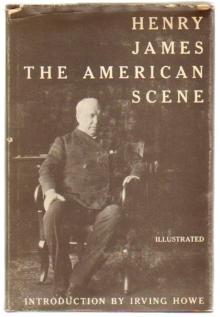 The American
The American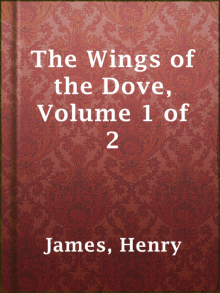 The Wings of the Dove, Volume 1 of 2
The Wings of the Dove, Volume 1 of 2 Frost at Midnight
Frost at Midnight Morning Frost
Morning Frost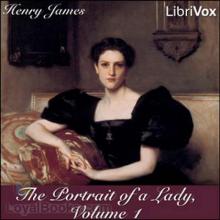 The Portrait of a Lady — Volume 1
The Portrait of a Lady — Volume 1 Fatal Frost
Fatal Frost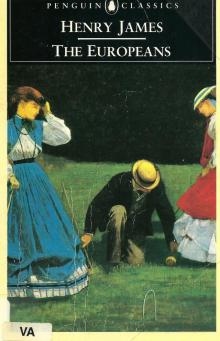 The Europeans
The Europeans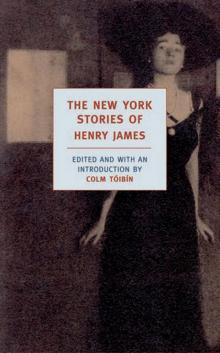 The New York Stories of Henry James
The New York Stories of Henry James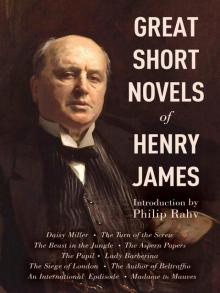 Great Short Novels of Henry James
Great Short Novels of Henry James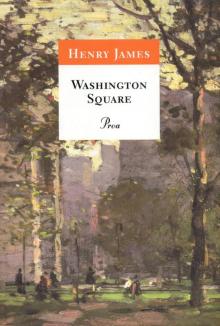 Washington Square
Washington Square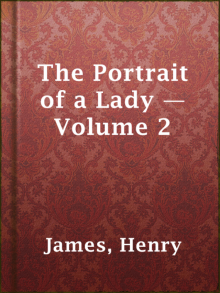 The Portrait of a Lady — Volume 2
The Portrait of a Lady — Volume 2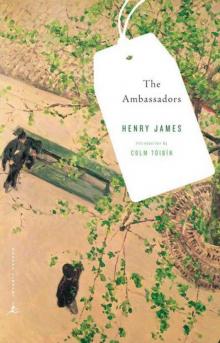 The Ambassadors
The Ambassadors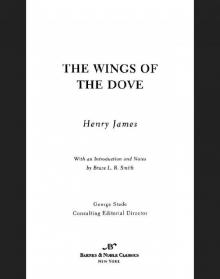 The Wings of the Dove
The Wings of the Dove The Princess Casamassima (Classics)
The Princess Casamassima (Classics) The Coxon Fund
The Coxon Fund First Frost
First Frost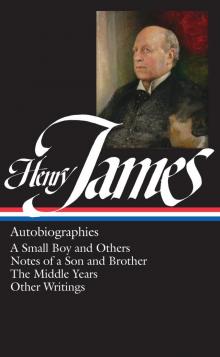 Henry James
Henry James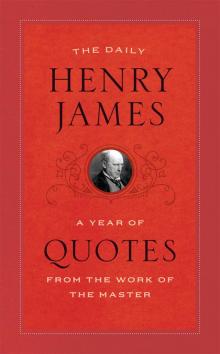 The Daily Henry James
The Daily Henry James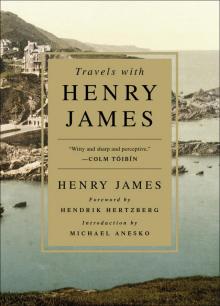 Travels With Henry James
Travels With Henry James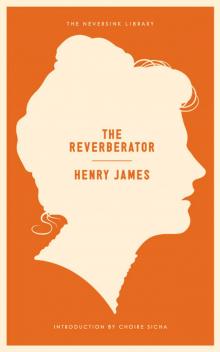 The Reverberator: A Novel
The Reverberator: A Novel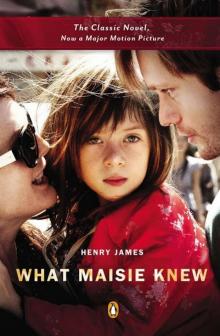 What Maisie Knew (Henry James Collection)
What Maisie Knew (Henry James Collection)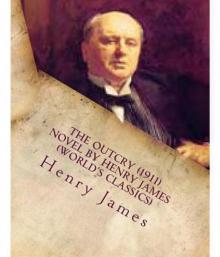 The Outcry
The Outcry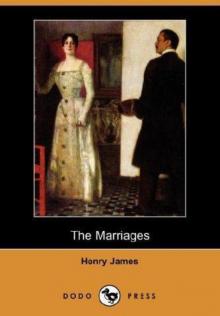 The Marriages
The Marriages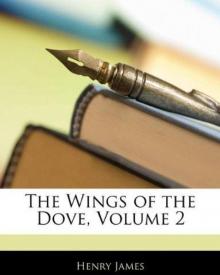 The Wings of the Dove, Volume 2
The Wings of the Dove, Volume 2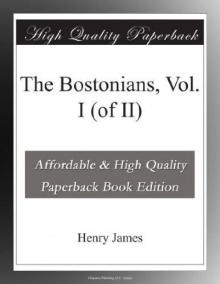 The Bostonians, Vol. I
The Bostonians, Vol. I The Outcry: -1911
The Outcry: -1911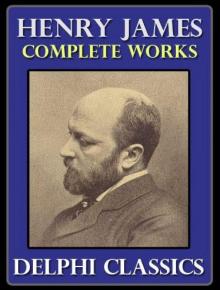 The Complete Works of Henry James
The Complete Works of Henry James Letters from the Palazzo Barbaro
Letters from the Palazzo Barbaro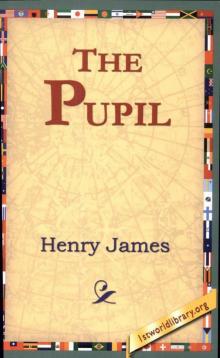 The Pupil
The Pupil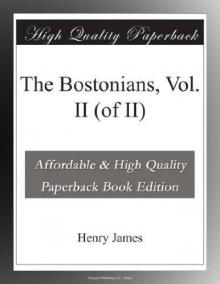 The Bostonians, Vol. II
The Bostonians, Vol. II Pandora
Pandora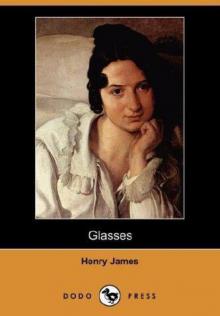 Glasses
Glasses The Princess Casamassima
The Princess Casamassima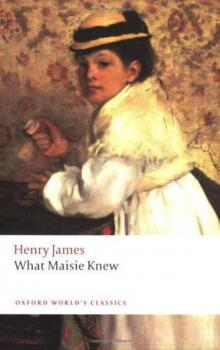 What Maisie Knew
What Maisie Knew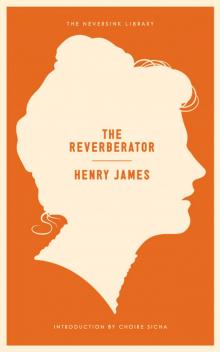 The Reverberator
The Reverberator The Golden Bowl - Complete
The Golden Bowl - Complete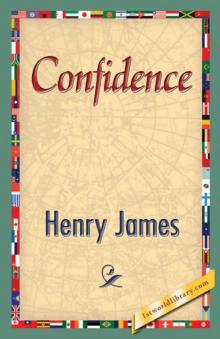 Confidence
Confidence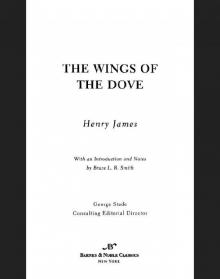 Wings of the Dove (Barnes & Noble Classics Series)
Wings of the Dove (Barnes & Noble Classics Series) The Spoils of Poynton
The Spoils of Poynton